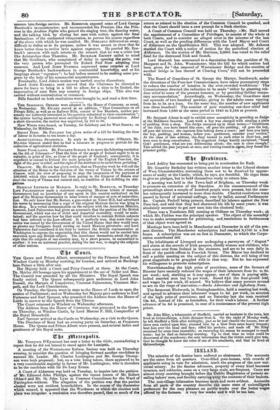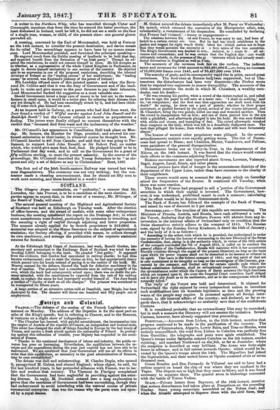IRELAND.
The miseries of the famine have suffered no abatement. The accounts are the same from all quarters. Over-filled poor-houses, with crowds of applicants suing in vain for admission, mark the progress of the now uni- versal misery. As the famine advances, property of every kind becomes insecure, and robberies, some on a very large scale, are frequent- Cases are almost every morning brought before the Dublin Magistrates of persons as- sailing bakers' men, and forcibly carryiu4 away the contents of their baskets.
The non-tillage infatuation becomes more and mere evident. Accounts from all parts of the country describe the same state of unintelligent preference for the easy pittance on public works over the better wages offered by the fanners. A very few weeks and it will be too late. A writer in the Northern Whig, who has travelled through Ulster and Connaught, mentions that from the time he entered the latter province, the least distressed in Ireland, until he left it, he did not see a smile on the face of a single man, woman, or child, of the peasant class: one general gloom pervaded all.
A meeting, convened by the Earl of Mountcashel, was held at Ferrnoy on the 14th instant, to consider the present destitution, and devise means for its relief. The assemblage appears to have been by no means nume- rous. Lord Mounteashel presided, and furnished the principal speaking—
He augured much from the Dublin meeting of landlords to be held that day, and expected benefit from the formation of "an Irish party." Though he ad- mired the resolutions, he could not commit himself to them. He felt scruples as to whether, as a representative of the whole United Kingdom in Parliament, he ought to devote himself exclusively to one section of the country. He objected also to an expression in one of the proposed resolutions, describing the internal divisions of Ireland as the "leading causes" of her misfortunes: the "leading cause," he averred, was England's jealousy of the power of Ireland!
His Lordship effused more of this pointed matter; and when the Reve- rend Dr. Collins said that it was the duty of Government and of the land- lords to unite and give money to the poor farmers to pay their labourers, Lord Mountcashel backed the suggestion as a most valuable one—
Should Government invest a large sum of money to be lent out to the tenant- farmers in small sums, it would be a better plan for relieving their distress than any yet thought of. He had been exceedingly struck by it, and had been think- ing of some such plan himself ere now.
At an inquest held in Galway, on a person who had died from want, the Jury found a verdict of" Wilful murder against Lord John Russell and Sir Randolph Routh"! but the Coroner refused to receive so preposterous a finding. The jurors were finally obliged to content themselves with the verdict that!' deceased died from want and the inclemency of the weather."
Mr. O'Connell's last appearance in Conciliation Hall took place on Mon- day. Mr. Somers, the Member for Sligo, presided; and avowed his con- tinued submission to their leader, in whatever course he thought best. Mr. O'Connell handed in 401. from dahada; and said that he was going to Par- liament, to support Lord John Russell, or Sir Robert Peel, no matter which, who woultl give most food, food, food. He pledged himself to be in Parliament that clay week, and, to call on the Government for a grant of .fifty millions sterling, to meet the present calamity. In the course of the proceedings, Mr. O'Connell described the Young Irelanders to be "as elo- quent and silly a set of fellows as any in Christendom." Rent, 1281.
The first sod of the Irish South-eastern Railway was turned last week, hear Bagenalstown. The ceremony was not very striking; but the con- tractor made a cheering announcement, that he should set fifty men to work next morning, and three hnndred in a week's time.



























 Previous page
Previous page